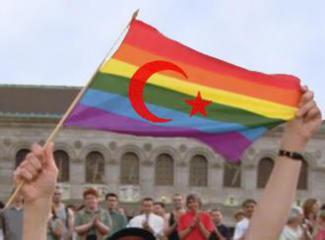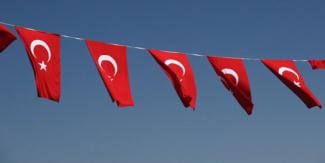Turkey Elections: Gay, Transsexual Candidates Spotlight LGBT Rights
With this weekend's victory in Ireland for same-sex marriage, we look to the next nation that may be battling political issues of LGBT rights and equality. Many think the most logical nation to be affected by Ireland's same-sex marriage vote would be Northern Ireland and this may be true in regard to marriage, but within the next two weeks another nation completely across Europe will be in the LGBT political spotlight.
Turkey appears poised to elect its first openly gay member of parliament in next month's elections, despite a rising tide of social conservativism in the Muslim-majority country.
The four LGBT activists running include 37-year-old Baris Sulu, who made history once already when he and his same-sex partner applied — unsuccessfully — for a marriage license in a test case that is still going through
the courts.
"We are here in this society, we have our problems and we want to be able to have our say," he told NBC News.
Another candidate is transgendered Deva Özenen, who is standing for the recently-founded secular nationalist Anatolia Party. She has been out campaigning on the streets of Izmir, a relatively liberal coastal city.
Homosexuality hasn't been illegal in Turkey since 1858 — during the dying days of the Ottoman Empire — but it is far from accepted. Recep Tayyip Erdogan, the country's president, has previously described it as a "sexual preference" that is "contrary to the culture of Islam." – NBCnews.com
Is there hope for any LGBT candidate in Turkey? A nation that banned the Grindr app in 2013 and whose military still categorizes homosexuality as a mental illness. Turkey has recently stopped the practice of requiring "intimate photographic evidence or family testimonials from anyone seeking exemption because of sexuality."
Most of us would label Turkey as a Muslim nation, but like Egypt, they are some differences than other neighboring and very strict Islamic states. There are no statistics of people's religious beliefs nor is it asked in the census. According to the government, 99.8% of the Turkish population is Muslim, mostly Sunni, some 10 to 15 million are Alevis The remaining 0.2% is other – mostly Christians and Jews (wikipedia).
Turkey has a visible gay scene, especially in comparison to its Arab neighbors. Istanbul's annual gay pride march attracted more than 100,000 participants in 2014 — including many attending from other countries in the region where similar events are banned. Role models in popular culture include celebrated transgender singer Bülent Ersoy.
"If you're out and you're a celebrity then it is OK but if you're a normal person you suffer discrimination," Gardner said. "People have been kicked out of their jobs. A lot depends on people's socio-economic status."
References to gay culture are sometimes censored from Western television imports and 85 percent of Turks say they would not like to have gay neighbors, according to the 2014 World Values Survey, compared to 20 percent of those surveyed in the United States. – NBCnews.com
So will any of these 4 Turkish candidates be elected due to their stance on LGBT issues? Most likely not. The major factor in this year's Turkish elections will be the economy, especially its unemployment.
Erdogan wants a strong parliamentary majority to push through constitutional changes to create a full presidential system, but with unemployment hitting 11.2 percent in the first three months of the year, some Turks are running out of patience with his AKP government which is leading the polls.
That dissatisfaction could see some tactical protest votes coming to smaller parties, including Sulu's left-wing and pro-Kurdish party, HDP. It needs to pass a 10 percent threshold of the total vote in order to win any seats, which could leave Sulu with a place in parliament. – NBCnews.com
So if Turkish LGBT candidates are elected in two weeks on June 7th, it may be by a side effect of voters focusing more on economic issues rather than social ones. Unlike the specific vote in Ireland this past weekend which has immediate effects and hopefully positive ripples across Europe and the world, if any of these 4 make it into office, may they be a great foundation for future LGBT Turkish rights issues.
"It would not directly increase tolerance for gay people in Turkey, instead it would be a positive externality of what is mostly an election about the economy and governance," he said.
Having gay members of parliament "would be symbolic and important," he added, "but politics in Turkey for the near future will still be about higher political issues and realpolitik, not individual rights."
Sulu acknowledged the challenges he was facing at the ballot box but remained optimistic. "Unfortunately right now it does not look possible [to get elected] but I opened the door of my candidacy for the next election and I hope we can see LGBT members of parliament within a few years," he said. – NBCnews.com
As in any election, let's hope the right candidate wins, LGBT or not. Just because a candidate identifies as LGBT, does not mean that they maybe the overall best person for the position. We do have many supporters that will fight for us that do not identify as LGBT. Best of luck Turkey!
To read the primary source, head on over to the original NBCnews.com article By Alastair Jamieson and Aziz Akyavas



